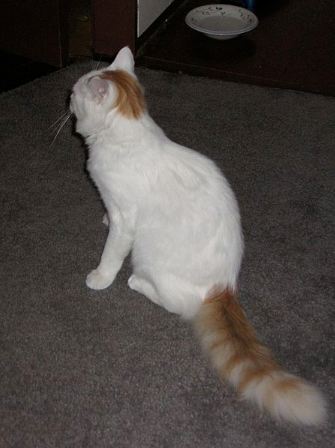Fondly regarded as the “swimming cat,” the Turkish Van has an innate love of water. It is not surprising to find them helping wash the dishes, joining their owners’ in the shower, or splashing in pools, ponds, or any other water available. This feline has a loving, loyal, and intelligent personality, but is often assertive and has a thing to stay on how you pet her.
Origin of the Turkish Van Cat
The Turkish Van’s name was derived from Lake Van, the largest lake in Turkey lying in the far east side of the country, where it was first known. The ancient breed is rare even in the region but may have existed for many centuries and thrived in seclusion from the world.
It was only in 1955 when they were brought to Europe. An English couple visited Turkey and were gifted a pair of kittens. The Westerners were amused to see the kittens fondly swimming on ponds and streams, bringing them to England as they went home.
The breed quickly gained attention, but the feline was scarce, even its homeland. Thanks to the efforts of many breeders, the breed was developed and preserved. Eventually, the Turkish Van reached the United States in 1982 and is now recognized by major cat registries.
Physical Characteristics of the Turkish Van Cat
Length: 14 to 17 inches
Weight: 9 to 20 pounds (Males), 7 to 12 pounds (Females)
Life Expectancy: 13 to 17 years
Coat Color: White
Type of Coat: Mid-long
Eye Color: Amber, blue or odd-eyed (each eye a different color)
Turkish Van cats are sleek, muscular felines with a thick chest. They have a short neck but boast robust, broad shoulders. These furballs are one of the largest breeds in the cat fancy, with females reaching up to 12 pounds, while males weighing up to 20 pounds. Their tail is distinct-looking, characterized by a ringed pattern. Meanwhile, the nose and paws are of a light pink tone. As a swimming cat, their coat is water-resistant and has a feel comparable to cashmere wool. The breed is often confused with its compatriot, the Turkish Angora, but the Ankara cat has a more refined look and boning structure.
Turkish Van Cat Personality
While not a “lap cat,” the Turkish Van is a loving, loyal cat who have other ways to show affection. They don’t like being held but will be happy to cuddle next to their owners on the couch. They have specific preferences on how they should be petted but will be delighted to sleep beside their families at night.
As social cats, they will build a strong bond with the very members of the household, but often choose one or two of them as his special humans.
Brimming with high energy and athleticism, these felines also carry their playfulness into old age. They aren’t as graceful their Turkish Angora cousins, though. These cats are massive and tend to clumsy.
Nevertheless, these are brilliant furballs that can learn a few tricks and games breezily. If not playing, they can be seen perching on high points in the house and enjoying knocking things over and watch whatever will happen.
Lastly, one thing that Turkish Van cats extremely relish is water, even if it gets them into trouble. They will be happy to play with water on the toilet bowl and sink, splash on ponds or pools, or open water faucets to begin their fun, aquatic expeditions.
Caring for the Turkish Van Cat
Thanks to their single, silky coat, Turkish Van cats require minimal upkeeps. Weekly brushing or combing can suffice in keeping it in tip-top condition. They shed during the spring and fall for their new coat, but it is very little and will not require extra effort. Moreover, their fur is water-resistant, making baths rarely necessary.
Other grooming requirements are primary care, such as trimming their nails every 10-14 days, cleaning any dirt-build up in their eyes and ears weekly, and brushing their teeth weekly to avoid periodontal disease. It is advisable to expose these cats to these grooming activities at a young age for them to become more welcoming of these practices and make it a fun bonding sesh for both sides.
Turkish Van cats have a big heart for play. Puzzle and interactive toys are suitable investments to keep them amused and on the move. Meanwhile, cat trees and perches will help them get safe climbing opportunities. As they love water, owners should put cover spas, pools, and toilet seats to avoid these cats getting into aquatic mishaps. If possible, allotting supervised water playtime every few weeks can help fulfill their desire to play in the water.
These felines are generally sturdy but can develop hypertrophic cardiomyopathy as with other cat breeds. Since they are already a massive cat, keeping them lean is also a must to avoid them from experience weight-related health issues, such as arthritis and diabetes. Consulting the veterinarian for their nutritional and preventative care needs is an excellent way to help them achieve optimum overall health.
Turkish Van cats’ love for water is inescapable, but so is the affection, loyalty, and devotion they are willing to provide with their owners. While they can be assertive at times, they have their own ways of showing warmth to families that would add them to their lovely homes.

